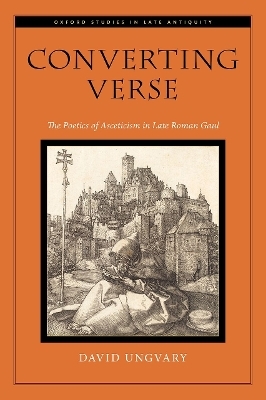
Converting Verse
The Poetics of Asceticism in Late Roman Gaul
Seiten
2024
Oxford University Press Inc (Verlag)
978-0-19-760074-0 (ISBN)
Oxford University Press Inc (Verlag)
978-0-19-760074-0 (ISBN)
Converting Verse provides a fresh account of the ways Christian poets in the late Roman world-especially those in the outlying provinces of Gaul-reinvented Latin poetry's purpose and power during the turbulent fifth century, a period that witnessed barbarian incursions, the rise of monasticism, and the collapse of the Western Roman Empire itself.
For centuries, the Roman aristocracy encoded its social and cultural superiority in classical poetry. In the late Roman world, however, Christian poets--especially those in the outlying provinces of Gaul--began to experiment with poetry as a medium for exploring and asserting ascetic identities which were based on the disciplined rejection of worldly life and set in opposition to secular nobility.
Converting Verse offers a new cultural history of this ascetic transformation of Latin poetry and fortifies our understanding of the Christianization of Roman culture in Late Antiquity. It provides a fresh account of the ways Gallo-Roman Christian poets composed verse amid barbarian incursions, the rise of monasticism, and the collapse of the Western Roman Empire itself, showing how they responded to cultural instability with literary performances of spiritual discipline and religious reform. Through the fifth century, these poets--Paulinus of Nola, Paulinus of Pella, Sidonius Apollinaris, and Avitus of Vienne, among others--wrote poetry that urged and expressed the recalibration of traditional dynamics between literature and identity in the Roman world, and in the process reinvented Latin poetry's power and purpose.
Drawing on critical insights from classical studies, religious studies, and literary theory, David Ungvary argues that the significance of Christian poetic experimentation was not restricted to the aesthetic domain but had profound social and cultural implications as well. In the unsettled world of late Roman Gaul, Christian verse writing produced strategies and practices of authorship, religious conversion, and Christianization that informed the emergent cultures of the post-Roman West.
For centuries, the Roman aristocracy encoded its social and cultural superiority in classical poetry. In the late Roman world, however, Christian poets--especially those in the outlying provinces of Gaul--began to experiment with poetry as a medium for exploring and asserting ascetic identities which were based on the disciplined rejection of worldly life and set in opposition to secular nobility.
Converting Verse offers a new cultural history of this ascetic transformation of Latin poetry and fortifies our understanding of the Christianization of Roman culture in Late Antiquity. It provides a fresh account of the ways Gallo-Roman Christian poets composed verse amid barbarian incursions, the rise of monasticism, and the collapse of the Western Roman Empire itself, showing how they responded to cultural instability with literary performances of spiritual discipline and religious reform. Through the fifth century, these poets--Paulinus of Nola, Paulinus of Pella, Sidonius Apollinaris, and Avitus of Vienne, among others--wrote poetry that urged and expressed the recalibration of traditional dynamics between literature and identity in the Roman world, and in the process reinvented Latin poetry's power and purpose.
Drawing on critical insights from classical studies, religious studies, and literary theory, David Ungvary argues that the significance of Christian poetic experimentation was not restricted to the aesthetic domain but had profound social and cultural implications as well. In the unsettled world of late Roman Gaul, Christian verse writing produced strategies and practices of authorship, religious conversion, and Christianization that informed the emergent cultures of the post-Roman West.
David Ungvary is Assistant Professor of Classics at Bard College.
INTRODUCTION
CHAPTER ONE
Verse and Conversion: Augustine and His Protégés
CHAPTER TWO
Authoring Asceticism in Late Roman Gaul, ca. 400-430
CHAPTER THREE
Verse and Incursion: The Epigramma Paulini and a Post-406 Poetics of Reform
CHAPTER FOUR
A Double Life: Paulinus of Pella's Eucharisticos
CHAPTER FIVE
Announcing Renunciation: Sidonius Apollinaris and Poetic Disavowal
CHAPTER SIX
The Poet and the Virgin: Avitus of Vienne's De Consolatoria Castitatis Laude
EPILOGUE
Beyond Gaul: Ennodius of Pavia's Eucharisticon
APPENDIX
Ennodius, Eucharisticon, Translated with Rachel Hodes
BIBLIOGRAPHY
| Erscheinungsdatum | 04.10.2023 |
|---|---|
| Reihe/Serie | Oxford Studies in Late Antiquity |
| Verlagsort | New York |
| Sprache | englisch |
| Maße | 152 x 226 mm |
| Gewicht | 499 g |
| Themenwelt | Literatur ► Lyrik / Dramatik ► Lyrik / Gedichte |
| Geschichte ► Allgemeine Geschichte ► Vor- und Frühgeschichte | |
| Geschichte ► Allgemeine Geschichte ► Altertum / Antike | |
| Geisteswissenschaften ► Geschichte ► Regional- / Ländergeschichte | |
| ISBN-10 | 0-19-760074-3 / 0197600743 |
| ISBN-13 | 978-0-19-760074-0 / 9780197600740 |
| Zustand | Neuware |
| Informationen gemäß Produktsicherheitsverordnung (GPSR) | |
| Haben Sie eine Frage zum Produkt? |
Mehr entdecken
aus dem Bereich
aus dem Bereich
Was Pompeji über uns erzählt
Buch | Hardcover (2023)
Propyläen (Verlag)
CHF 44,75
auf den Spuren der frühen Zivilisationen
Buch | Hardcover (2023)
C.H.Beck (Verlag)
CHF 27,95


